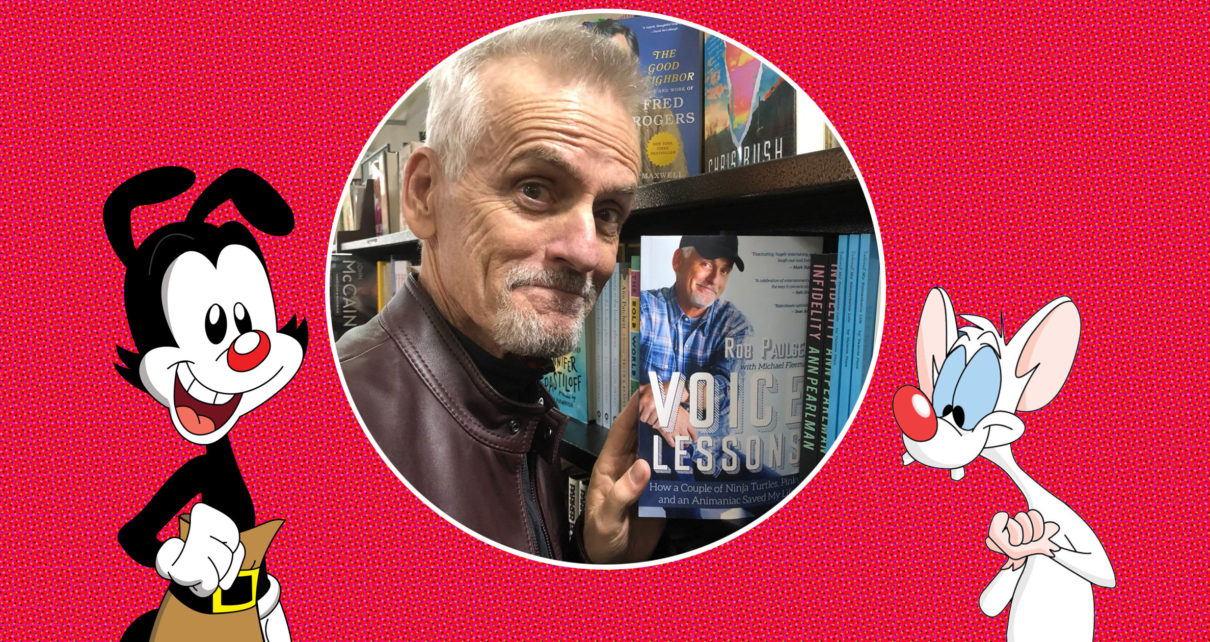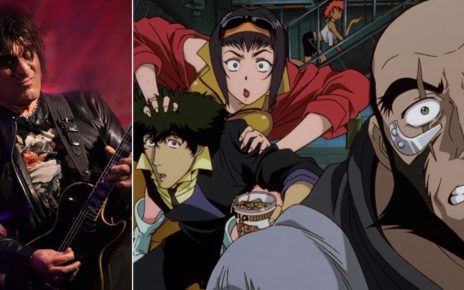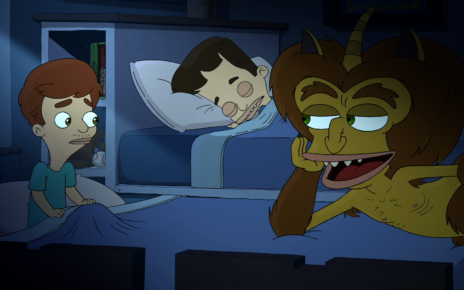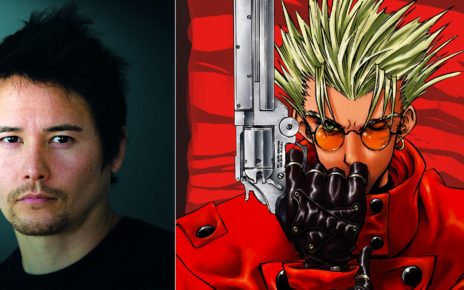Rob Paulsen’s voice has a special place in many hearts. Whether it’s as Raphael in the original Teenage Mutant Ninja Turtles, Yakko from Animaniacs, Pinky from Pinky and the Brain, Carl from Jimmy Neutron, or Donatello in Nickelodeon’s Teenage Mutant Ninja Turtle reboot, he’s been bringing beloved cartoon characters to life for decades.
After being diagnosed with throat cancer in 2016, Paulsen feared the worst— but has been able to come back stronger than ever. Between voicing characters, appearing at conventions, and uplifting fans every chance he gets, he’s a busy guy. He’s even been named the 2020 spokesperson for Head and Neck Cancer Alliance Awareness Week.
Luckily for us, Paulsen was able to find some time to discuss his recently released book (entitled Voice Lessons), explore what’s next for him creatively and geek out about the incredible power of cartoons.
So I hope you’ll excuse my fangirling, but we’re all huge fans over at The Dot and Line! We even have a semi-regular Dr. Scratchansniff column.
Rob Paulsen: What!? Wow! I love that guy! [Dr. Scratchansniff voice] I love that guy! I’m Dr. Scratchansniff as well! I am the person you were impersonating!
[Laughs, switches back to normal voice] This is not false modesty. I’m good at my job, but the characters are famous. I don’t draw them, I don’t write them! I’m a very, very lucky fellow. There is, to be sure, something really cool about being the voice of characters that have become iconic. I really appreciate you taking the time to tell me how much these characters mean to you and your friends.
Do a lot of people reach out to you about characters you’ve voiced?
You know, it is never not incredible to me how deeply people connect with these characters. It’s a remarkable experience, to be sure. Since I’ve been able to write the book and still work and travel, I’m having people literally come out of the woodwork, so, yeah, that happens a lot! I’m learning that this connection gets them through impossibly difficult times, and I never would have known about it otherwise.
In the book, there’s a very touching story how you connected with one particular Teenage Mutant Ninja Turtles fan who was living with muscular dystrophy. How did it feel when he reconnected with you later in life?
He was the living example of Turtle Power. It’s pretty tough for me to believe there was not some fate involved. He just reached out to me on MySpace, and it was through his action that I was able to see what a difference it had made in his life.
It was remarkable, and a perfect example of the way these characters affect people. I don’t have empirical data, but I could make the argument anecdotally that people’s lives are changed for the better. This connection may even help people live a little longer, live a little better in the face of some pretty intense odds. Whatever it is that fires someone up to concentrate on the joy in their lives makes a difference. It’s such a powerful experience, but very hard to put into words. I have learned how powerful these characters are through countless people who love them.
Do you feel any sort of pressure to always be “on”?
I don’t feel the pressure. I think because I really love what I do! The pressure for me is more having to learn when to turn it off. [laughs] It’s not about money, it’s not about action figures, it’s not about ratings. It’s about the pure expression of joy fans get that I’ve had a hand—or voice, rather—in creating. I can’t get enough of it.
That’s the jones that performers wish for, and it’s just part of who I am. It really feels like part of my soul, and it’s powerful. As I’ve gotten older, I’ve gotten better about knowing when it’s time to pull back, but in terms of getting the pressure to do it: Never.
Between your podcast, live shows, and ongoing work, are you satiated creatively? Or do you find yourself always looking toward the next thing?
Honestly? Yes and yes! If I were to expire right at this moment, it would be inconvenient for you, but other than that I would have nothing to be sad about. When I was diagnosed, I had already had a marvelous career. And I’m still working every day.
I have a legacy of characters that I was involved in that have made, I don’t know, a couple million people happy? I’d hazard a guess that there’s places in the world where people might not know Brad Pitt, but they know Raphael! I’m tellin’ ya, what keeps me going, and what makes me want to perform at a high level is knowing is all I have to do is get out there and I have this superpower. Once I tap into it, ain’t nobody who feels better than I do.
How has your battle with cancer impacted your outlook?
I was like this all the time. I was like this before cancer, but I’m more like this now! I think, depending on circumstances and the way we embrace our difficulties, we can learn. It’s almost like, “Holy smokes! Because of cancer, I can talk about my experience, and be joyful, inspirational, and an interesting case.”
Because I made my career with my voice and got throat cancer for god’s sake, now I can do more with my gig than just make a living: I can help! I can bring joy and be an example because I now have a book, and a platform. I do have new projects, and I’m totally fulfilled, but I still get to shove more in there. And this aspect of it is a result of being diagnosed with cancer! I almost feel grateful that I was. I would not recommend it, and I don’t want to go through it again. But all I had to do was get through it.
You mention being an “armchair scientist” in your book. Is there any chance we’ll see some scholarly works from Dr. Scratchansniff himself?
[Dr. Scratchansniff voice] Oh, vell now you are scratching the Scratchansniff surface!
[Normal voice] I would love to write another book, because I really enjoyed the process. I have to say, it seems to be being received quite well. I gotta give all the credit to my co-writer, Mike; he knew how to structure the book.
I would love to do a scholarly, yet-tongue-in-cheek look at…the power of joy, maybe? I know there’s a zillion books out there on that topic, but as I said in my book and as I’ve said in my podcast forever, “Laughter’s the best medicine! The cool thing is you can’t OD and the refills are free!”
But I would love to talk about that stuff. Because people really connect with these characters, and I see over and over and over again the power of these characters to allow children and big children to focus and get outside their heads to engage more effectively.
I want to write something that can be helpful and scholarly and still humorous, because that’s what I know.
How do you feel about voicing more “adult” cartoons, like Rick and Morty, compared to shows made for a younger audience? Or are you in the camp that all cartoons are for all ages?
Certainly there are shows that are geared towards very young children, but I do believe that the best animation is written to appeal to children of all ages. Animaniacs is a great example … From the beginning, the edict from Mr. Spielberg was to never condescend. It was like, “Look, we can say ‘United States, Canada, Mexico, Panama’ and we can blow people’s minds.” It’s a brilliant little two-minute cartoon, irrespective of who the voice guy is! I’m sure you could go back and watch the show now, and there would be cultural references that you missed as a kid.
But there’s also an envelope that you push. Rick and Morty pushes it sometimes, not as much as Robot Chicken, and sometimes not as much as Family Guy, and that gets into “blue” territory. And while I’m by no stretch of the imagination a prude, I also understand the audience.
So, here’s an example: Seth Green is a dear friend and one of the guys who runs Robot Chicken. So when I got a call like, “Hey man, we’re gonna lampoon Animaniacs,” I respectfully turned it down. I get it! Everyone likes to hear their favorite cartoon characters swear. But the characters mean so much to me, in the context of what they mean to other people. So I took a pass. But I did other episodes of Robot Chicken—just not with characters that I was involved in.
There’s a place for all stuff. I do believe that you can find ways to make things adult, funny, even a little bit naughty (like “fingerprints”— even Prince got a kick out of that one!) and still make something that you can watch with your five-year-old.
What do you think needs to be done to make sure shows reflect the diversity that’s actually present in society?
You know, shows that I’m working on now have characters who are on the autistic spectrum, and we include people to construct the show who are also on the autistic spectrum. And they’re profoundly gifted, much more than I can even fathom!
And I’ve had remarkable experiences at conventions as well, and the overarching takeaway at every one of them is utter inclusivity. There are folks who struggle with sensory overload who stand in line for hours because they have to meet Yakko. And the moment I start [Yakko voice] doin’ this [normal voice] it makes it worth it for them.
We still deal with our prejudices, but what I see is the acceptance of people who are transgender, neurodivergent, black, white, tall, thin, fat, short, and it’s never not amazing to me. What happens is that the people in charge now were kiddos who grew up in this culture. And because they were fans, because they have every single Teenage Mutant Ninja Turtle action figure, they know what other people want to see on these shows, and there will be less and less reason for people to be marginalized.
I mean, if we can have a circumstance where we can help people be happy, joyful, and spread excitement and inclusivity and still pay our bills, holy smokes! What better way to do it? And this is a direct result of times changing. It’s a pleasure and privilege to see it happening.
You’ve voiced not just one, but two Ninja Turtles. So the real question is: Which Turtle is your favorite?
My answer is: yes!
What a wonderful choice to have to make. I had the privilege of being a part of something that turned out to be probably the animation franchise of a lifetime.
Then, 25 years later, folks who grew up watching the original show are now at Nickelodeon saying “Gosh, we like Rob Paulsen, but I don’t know if we really want him for Raphael. With the sensibilities we like in his other characters, he might be cool for our vision of what we want for Donatello.”
I am 50% of the Ninja Turtles, in one career. There are people who like the original better, and there are people who like the 2012 version better, and all it does is expand the fanbase. It’s all glorious! I’m not trying to be coy. I could pick either one. So whether I say [Raphael voice] “Shredder!” or [Donatello voice] “He’s got me by the face, Mikey! The FACE!”, [normal voice] it’s wonderful.
But I like Raph, I like Donnie, [Carl voice] I like Carl, and [Yakko voice] I like Yakko, and [Pinky voice] I like Pinky. The person who gets the most out of all of this is me, so thank you so very much for taking the time to let an old Ninja Turtle ramble on.
The pleasure was all ours, Mr. Paulsen. Cowabunga!





